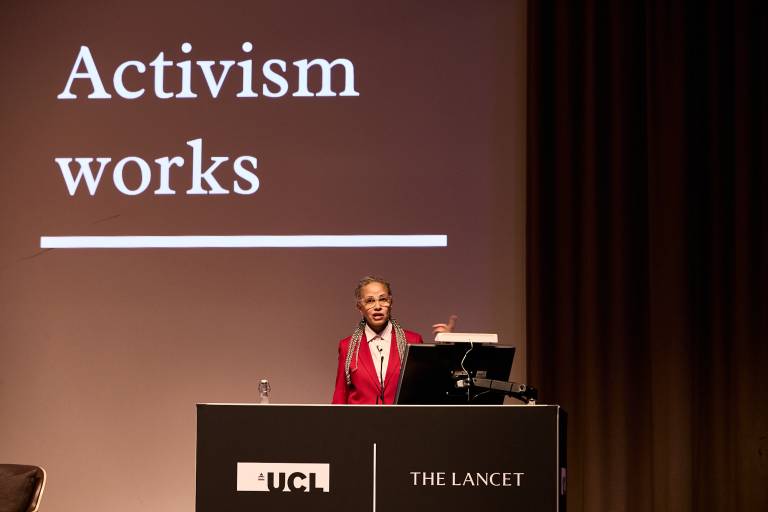Professor Linda Villarosa delivers keynote speech for UCL-Lancet Lecture 2024
16 May 2024
The 2024 UCL-Lancet Lecture was delivered by New York Times journalist and author Professor Villarosa.

The UCL-Lancet Lecture is a prestigious annual global health event open to the public, co-hosted by the UCL Institute for Global Health, UCL Grand Challenges and The Lancet.
This year, Professor Linda Villarosa's lecture discussed her work on the societal forces that cause Black people to “live sicker and die quicker” compared to their white counterparts.
A prominent figure in journalism, academia, and health advocacy, Professor Villarosa currently holds positions at the City University of New York (CUNY), where she teaches journalism, pre-med, and Black Studies courses. Her journalistic career spans editorial roles at the New York Times and Essence Magazine, with numerous accolades recognizing her impactful writing on race, health, and inequality.
An accomplished author, Professor Villarosa has authored and co-authored three books, including "Body & Soul: The Black Women's Guide to Physical Health and Emotional Well-Being" and "Passing for Black," the latter earning a Lambda Literacy Award nomination. Her latest work, "Under the Skin: The Hidden Toll of Racism on American Lives and on the Health of Our Nation," received acclaim as a 2023 Pulitzer Prize finalist and was featured in the New York Times' '10 Best Books of 2022.'
Professor Villarosa’s talk “Under the Skin: Understanding the Toll of Race and Inequality on the Health of People” connected the ways in which Black lives are far too often shaped by illness and suffering related to a range of factors: medical discrimination, environmental racism and government neglect.
During her lecture, Professor Villarosa challenged prevailing medical myths rooted in historical exploitation, emphasizing that contemporary health disparities stem primarily from systemic racism rather than inherent biological differences. She articulated “The newer explanation is not that something is different about the Black community, or something is different about individual Black people’s bodies but that the problem is racism. It is ill treatment that causes poor health outcomes.”
In "Under The Skin” Professor Villarosa presents three key explanations for the adverse health outcomes experienced by Black Americans. She outlines them as; discrimination and bias creating wear and tear on the body, centuries of sanctioned segregation and discrimination has made Black communities less healthy, and racism in the medical system harms Black people.
Drawing from personal experiences in the lecture, she illustrated each contention, underscoring the profound impact of systemic biases on health outcomes.
The latter part of Professor Villarosa's lecture focused on proactive steps to address these disparities, highlighting the role of activism and education in fostering meaningful change. She said “I see a generation of medical students that are really engaged, that are really interested, energised, to talk about health inequality.” Professor Villarosa went on to list the variety of successes activism has had on tackling racial health inequality including the removal of the statue J Marion Simms, an American physician who experimented on enslaved women in the mid-1800s, after a year of sustained protest.
Professor Villarosa concluded her speech with a focus on her final slide, a collage of faces of her pre-med students at CUNY Medical School. She finished her lecture with, “This slide is my last one because it is the hope, and it is the future,” passionate remarks which garnered a standing ovation from much of the audience.
Respondents Professor Delan Devakumar and Dr Rochelle Burgess then joined Professor Linda Villarosa and Dr Richard Horton for an enlightening question and answer session.
The event was closed with thanks and reflection from UCL President and Provost, Dr Michael Spence. He said, “I think if we keep together that capacity to think across the disciplines and that constant process of self-reflect and that cultivation of epistemic hum in our students with the kind of activist fire that was evident tonight, well then I have a little bit of hope for the future.”
Links
- Watch the lecture recording on YouTube
- UCL-Lancet Lecture
- UCL Institute for Global Health
- UCL Grand Challenges
- The Lancet
Image
- Credit: Lucy Pope
 Close
Close

